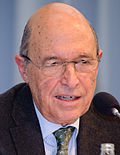| |||||||||||||||||||||||||||||||||||||||||||||||||||||||||||||||||||||||||||
All 300 seats in the Hellenic Parliament 151 seats needed for a majority | |||||||||||||||||||||||||||||||||||||||||||||||||||||||||||||||||||||||||||
|---|---|---|---|---|---|---|---|---|---|---|---|---|---|---|---|---|---|---|---|---|---|---|---|---|---|---|---|---|---|---|---|---|---|---|---|---|---|---|---|---|---|---|---|---|---|---|---|---|---|---|---|---|---|---|---|---|---|---|---|---|---|---|---|---|---|---|---|---|---|---|---|---|---|---|---|
| |||||||||||||||||||||||||||||||||||||||||||||||||||||||||||||||||||||||||||
 Results by constituency | |||||||||||||||||||||||||||||||||||||||||||||||||||||||||||||||||||||||||||
| |||||||||||||||||||||||||||||||||||||||||||||||||||||||||||||||||||||||||||
| This article is part of a series on |
| Politics of Greece |
|---|
 |
Parliamentary elections were held in Greece on 22 September 1996. [1] The ruling PASOK of Costas Simitis was re-elected, defeating the liberal-conservative New Democracy party of Miltiadis Evert.




